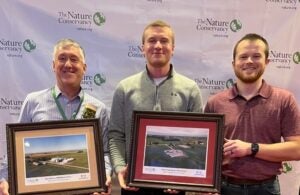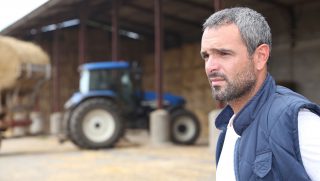In Michigan, The Nature Conservancy shares a goal with farmers: a thriving and resilient Saginaw Valley.
About 20 percent of Michigan’s agricultural acres are within the 5.5-million-acre Saginaw Bay watershed. This watershed features Michigan’s highest concentration of prime farmland, an abundance of freshwater resources, and ideal growing conditions supporting a diversity of crops not seen elsewhere in the Midwest.
Soil health principles — such as reducing tillage, armoring fields with vegetative cover, and precisely managing nutrient inputs — can help reduce input costs, rebuild soil structure, and buffer farm fields against weather extremes, all while protecting water quality.
On Jan. 25, TNC in Michigan honored three Saginaw Valley farmers as Soil Health Heroes.
“This year’s Soil Health Heroes have shown us what it looks like to walk the talk when it comes to implementing healthy soil practices and providing the Saginaw Valley farming community outstanding examples of how these practices can and do support healthy crops, build in-field resiliency against extreme weather and protect our local waterways,” said Ben Wickerham, agriculture program director for The Nature Conservancy in Michigan. “These winners represent the future of regenerative agriculture in Michigan, and we’re honored to share their stories. I have no doubt their soil-first approach to farming will positively impact the industry for years to come.”

The 2023 Soil Health Hero Award winners were:
Legacy: Wayne Bierlein (Reese, Michigan)
Owner of WMW Bierlein Farms, Wayne has been utilizing no-till practices on more than 1,500 acres for over five years and utilizes cover crops on most of those acres each year. Wayne leads a Farmer-Led Watershed Group in his area and works with neighboring farmers to help them improve their soil practices.
Innovator: James Weber (Vassar, Michigan)
James owns Weber Dairy, a medium-sized dairy farm with roughly 250 milking cows. His 550-acre farm utilizes a Recycled Manure Solids System and includes approximately 20 acres of a native harvestable buffer along surface waters. He also sits on the Michigan Milk Producers Association Sustainability Committee.
Conservation Newcomer: Caleb and Cody Symons (Chesaning, Michigan)
Brothers Caleb and Cody own Symons Farm. Not to be outdone by farmers twice their age, their 550-acre farm is verified by the Michigan Agriculture Environmental Assurance Program. They have also enrolled in a grant-funded soil sampling program for the Saginaw Bay Watershed, which ultimately led them to develop a nutrient management plan for their farm. The plan is now actively applied using Variable Rate Technology on all acres.
Farmer awardees were peer-nominated and selected by an independent review committee of cross-cutting agricultural partners.
Conservation Excellence in Agribusiness Award winner
Earlier this month, TNC also announced the winner of their annual Conservation Excellence in Agribusiness Award at the 2024 Michigan Agribusiness Winter Conference in Lansing, Mich.
This year’s winner was Sarah Michalek of the Michigan Milk Producers Association. Sarah is the sustainability supervisor for MMPA and has overseen many initiatives aimed at reducing the carbon footprint of the dairy supply chain. She has managed on-farm sustainability programs, including Feed in Focus, a partnership project with The Nature Conservancy, which to date has enrolled over 15 Michigan dairies and reduced 93 tonnes of CO2 equivalents.
“As word continues to spread about how well healthy soil practices are working on farms across the Saginaw Valley, we’re hopeful it supports and informs ongoing conversations about conservation among our farmer partners,” Wickerham said. “That’s what leadership by example is all about, and our Soil Health Heroes are doing it daily. The examples set on their farms speak for themselves, and the agriculture community is listening.”
»Related: Soil health and carbon sequestration are vital paths to long-term farm profitability

